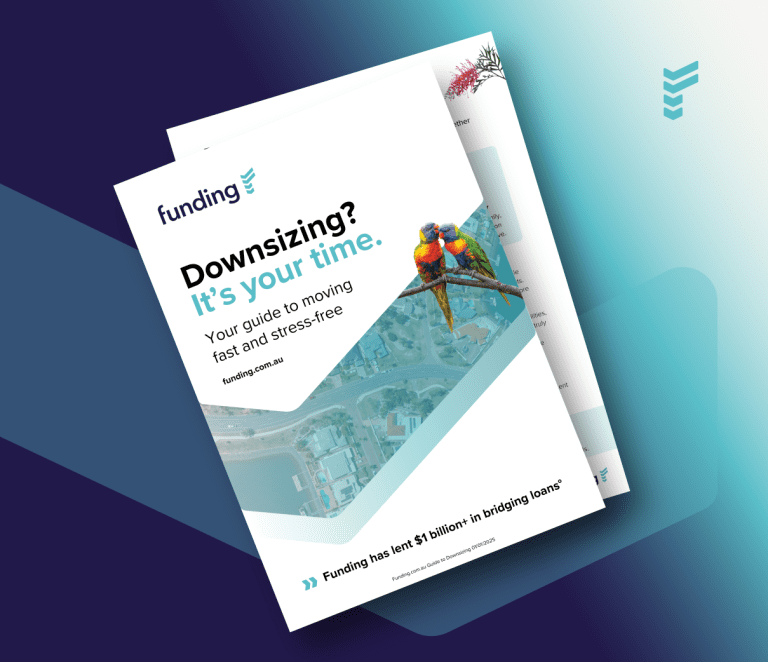Funding.com.au Pty Ltd A.B.N. 33 603 756 547.
Funding Commercial Pty Ltd A.C.N. 634 414 127 is a lending entity of business/commercial loans.
Funding Pty Ltd A.C.N. 607 035 861 Australian Credit Licence 483665 is a lending entity of consumer/personal loans.
° Total lent by all Funding Group entities.
* Settlement within 3 days is based on the application form being fully completed and all required supporting documentation being provided.
** Conditional approval within 4 hours applies during business hours. Requests made after 4 pm Friday AEST will receive a quote the next business day.
^ The Comparison Rate is calculated on a $150,000 secured loan over a 25-year term, and may not include all fees and charges. Different terms, fees or other loan amounts might result in a different rate. Comparison rates for interest-only loans will not reduce your loan balance. This may mean you pay more interest over the life of the loan. Government charges apply.
The information provided is general in nature and does not constitute personal financial advice. It has been prepared without taking into account your objectives, financial situation, or needs. You should consider whether the information is appropriate to your circumstances before acting on it or seek financial advice. Eligibility and approval are subject to standard credit assessment, and not all amounts, term lengths, or rates will be available to all applicants. Fees, terms and conditions apply. Refer to our Credit Guide.
GENERAL DISCLAIMER
Any investment rate of return and terms displayed are specific to the individual mortgages and therefore subject to the performance of that individual mortgage investment. Any rate of return and income is targeted, are not guaranteed and are shown net of any fees.
- Borrowers: Lending criteria, fees and conditions apply. For consumer or personal loans please refer to our Credit Guide for more information. Australian Credit Licence 483665.
- Platform Investors: The following disclaimers apply to investors in the Funding Investment Trust, ARSN 616 185 276 (“the Trust”). Funding.com.au Pty Ltd ACN 603 756 547 is The Manager of the Trust and authorised representative (no. 1239776) of Funding Capital Pty Ltd ACN 639 230 345 (AFSL 523 247). Melbourne Securities Corporation Ltd ACN 160 326 545 (AFSL 428 289) is the trustee and responsible entity of the Trust. It is important for you to read the Product Disclosure Statement (PDS) for the Trust before you make any investment decision. The PDS is available on our website or by calling 1300 44 33 19. You should consider carefully whether or not investing in the Trust is appropriate for you. The rates of return from the Trust are targeted and not guaranteed and are determined by the future revenue of the Trust and may achieve lower than expected returns. Past performance is not a reliable indicator of future performance. Investors risk losing some or all of their principal investment. The investment is not a bank deposit. IMPORTANT: Information provided is general information only and should not be taken as legal or financial advice. It does not consider the specific needs, investment objectives or financial situation of any particular investor and you should seek advice from a professional financial adviser. Please refer to the Financial Services Guide for more information. Direct Investors: The direct mortgage investments do not form part of the Funding Investment Trust, ARSN 616 185 276 and the PDS does not apply to such investments. See Privacy, Terms, Credit Guide, Target Market Determination (Credit) and Target Market Determination (Invest) for more details.
DISCLAIMER: Funding Income Trust (“the Trust”).
Any investment rate of return and terms displayed are specific to the pool of mortgages and therefore subject to the performance of those mortgage investments. Any rate of return and income is targeted, are not guaranteed and are shown net of any fees. Funding.com.au Pty Ltd ACN 603 756 547 is the manager of the Trust and authorised representative (no. 1239776) of Funding Capital Pty Ltd ACN 639 230 345 (AFSL 523247). Funding Capital Pty Ltd ACN 639 230 345 AFSL 523247 is the trustee of the Trust. It is important for you to read the Information Memorandum (IM) for the Trust before you make any investment decision. The IM is available on our website or by calling 1300 44 33 19. You should consider carefully whether or not investing in the Trust is appropriate for you. The rates of return from the Trust are targeted and not guaranteed and are determined by the future revenue of the Trust and may achieve lower than expected returns. Past performance is not a reliable indicator of future performance. Investors risk losing some or all of their principal investment. The investment is not a bank deposit.
IMPORTANT: Information provided is general information only and should not be taken as legal or financial advice. It does not consider the specific needs, investment objectives or financial situation of any particular investor and you should seek advice from a professional financial adviser.
Please refer to the Financial Services Guide for more information. See Privacy, Terms and Credit Guide for more details.


